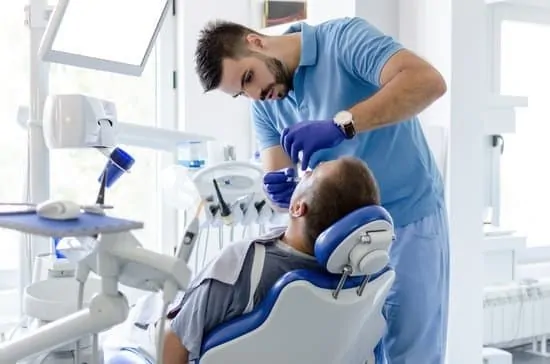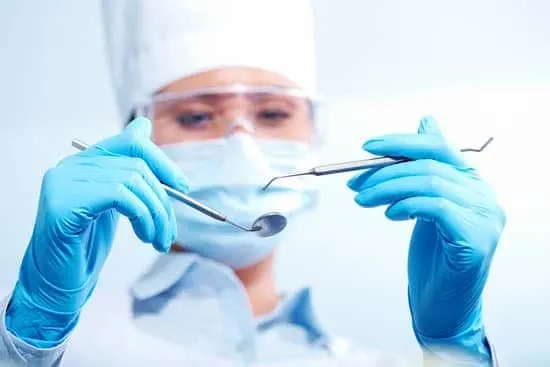We all find ourselves in a dentist’s chair, no matter how much we may try to avoid it. Whether it’s a regular checkup, minor dental work, or something more substantial, it’s the price we pay for keeping our pearly whites in top condition. A special type of dentist may sometimes be called for to look into your or a loved one’s case, known as an oral and maxillofacial surgeon.
These are some of the rarest and most highly qualified medical and dental practitioners that exist, which means that you should consider yourself in good hands whenever you come face to face with one.
Oral and Maxillofacial Surgeons are dental specialists who perform surgical procedures involving the mouth, jaw, and face. They receive extensive training that combines dental education with medical knowledge and surgical techniques. Here are some key aspects of the work and expertise of oral and maxillofacial surgeons:

Oral and Maxillofacial Surgery Dentist
An “Oral and Maxillofacial Surgery Dentist” is not a standard title or recognized specialty. However, if you meant to ask why someone would go to an Oral and Maxillofacial surgeon who also practices general dentistry, there can be several reasons for doing so:
- Comprehensive Care: Some Oral and Maxillofacial surgeons have training in oral surgery and general dentistry. This allows them to provide comprehensive care to their patients, offering a wide range of dental services alongside their surgical expertise. Patients may choose such a practitioner for convenience, as they can receive both routine dental care and specialized surgical treatments from the same professional.
- Seamless Treatment Planning: When a patient requires both dental procedures and surgical interventions, seeing an Oral and Maxillofacial surgeon who is also a dentist can ensure better coordination and treatment planning. The practitioner can develop a comprehensive plan that integrates the surgical aspects with the necessary dental treatments, ensuring optimal results and a streamlined treatment experience.
- Preoperative Dental Assessment: Before undergoing certain oral and maxillofacial surgeries, such as jaw surgery or implant placement, assessing and addressing any existing dental issues may be important. An Oral and Maxillofacial surgeon who is also a dentist can perform the necessary dental evaluations, identify any dental concerns that could impact the surgery, and provide appropriate dental treatments before the surgical procedure.
- Continuity of Care: If a patient has been receiving dental care from a specific Oral and Maxillofacial surgeon who later becomes qualified as a dentist, they may choose to continue their care with the same practitioner. This ensures continuity of treatment, as the dentist-surgeon is already familiar with the patient’s dental and medical history.
- Specialized Expertise: While Oral and Maxillofacial surgeons with dental qualifications offer general dental services, their primary expertise lies in surgical procedures and oral pathology. Patients who specifically require their surgical skills may opt to see them for surgical treatments, even if routine dental care is not their primary concern.
It’s important to note that not all Oral and Maxillofacial surgeons also practice general dentistry and the qualifications and services offered can vary. It’s recommended to research and consult with dental professionals to determine their specific areas of expertise and the services they provide before making an appointment.
What differentiates the Oral and Maxillofacial surgeon from your regular dentist?
Oral and Maxillofacial surgeons are dental specialists who undergo extensive additional training beyond what a regular dentist receives.
Here are some key differences that set them apart:
- Education and Training: Oral and Maxillofacial surgeons complete a full dental education, which includes four years of dental school to become a general dentist. However, they go on to complete an additional four to six years of specialized surgical training. This comprehensive training covers both dental and medical aspects, focusing on diagnosing and treating conditions related to the face, jaws, mouth, and associated structures.
- Scope of Practice: Regular dentists primarily focus on oral health maintenance, prevention, and general dental treatments such as fillings, cleanings, extractions, and root canals. In contrast, Oral and Maxillofacial surgeons perform complex surgical procedures involving the face, jaws, teeth, and oral structures. They are trained to diagnose and treat conditions such as impacted teeth, facial trauma, oral pathology, facial deformities, jaw misalignments, and temporomandibular joint disorders (TMJ).
- Anesthesia and Sedation: Oral and Maxillofacial surgeons have extensive training in administering various levels of anesthesia and sedation techniques. They are skilled in providing local anesthesia, IV sedation, and general anesthesia when needed. This allows them to perform surgical procedures comfortably and safely, often in outpatient settings or hospitals.
- Surgical Procedures: Oral and Maxillofacial surgeons are proficient in a wide range of surgical procedures. These may include complex tooth extractions (including impacted wisdom teeth), dental implant placement, corrective jaw surgery (orthognathic surgery), treatment of facial infections and injuries, bone grafting, reconstructive surgery, cleft lip and palate repair, and oral cancer diagnosis and treatment.
- Collaborative Approach: Oral and Maxillofacial surgeons often work closely with other dental specialists, such as orthodontists, prosthodontists, and periodontists, as well as medical professionals from various disciplines. They collaborate to provide comprehensive treatment plans for patients requiring multidisciplinary care.
It’s important to note that while Oral and Maxillofacial surgeons have a broader scope of practice compared to regular dentists, both play crucial roles in oral health care. Regular dental visits for check-ups, cleanings, and preventive care are essential for maintaining oral health, while Oral and Maxillofacial surgeons are specialists who handle complex surgical procedures and conditions involving the face and jaws.

Why make an appointment with an oral and maxillofacial surgeon?
There are several reasons why someone might need to make an appointment with an Oral and Maxillofacial surgeon.
Here are some common situations where their specialized expertise may be required:
- Impacted Teeth: If a tooth fails to fully emerge from the gums or grows in an abnormal position, it is considered impacted. Wisdom teeth are particularly prone to impaction. Oral and Maxillofacial surgeons are skilled in extracting impacted teeth, including surgical removal of wisdom teeth.
- Dental Implants: Oral and Maxillofacial surgeons are experienced in the placement of dental implants. These artificial tooth roots are surgically inserted into the jawbone to support dental restorations like crowns or bridges. If you are considering dental implants as a tooth replacement option, an Oral and Maxillofacial surgeon can assess your suitability, plan the implant placement, and perform the surgery.
- Corrective Jaw Surgery: For individuals with significant jaw misalignment or facial asymmetry, corrective jaw surgery, also known as orthognathic surgery, may be recommended. Oral and Maxillofacial surgeons specialize in this procedure, which involves repositioning the jaws to improve both functionality and aesthetics.
- Facial Trauma: In the event of facial injuries resulting from accidents, sports-related incidents, or assaults, an Oral and Maxillofacial surgeon can provide prompt evaluation and treatment. They are trained in managing fractures of the facial bones, soft tissue injuries, and other facial trauma cases.
- Oral Pathology: If you have abnormal growths, lesions, or suspicious areas in your mouth, an Oral and Maxillofacial surgeon can evaluate and diagnose oral pathologies, including oral cancer. They may perform biopsies, recommend appropriate treatment, or refer you to an oncologist if necessary.
- TMJ Disorders: Temporomandibular joint (TMJ) disorders can cause pain, discomfort, and dysfunction in the jaw joint and surrounding muscles. Oral and Maxillofacial surgeons can diagnose and treat TMJ disorders, offering various treatment options such as medications, physical therapy, oral appliances, or in some cases, surgery.
These are just a few examples of situations where making an appointment with an Oral and Maxillofacial surgeon would be beneficial. If you have a specific concern related to your face, jaws, mouth, or oral structures that goes beyond the scope of regular dental care, consulting with an Oral and Maxillofacial surgeon would be appropriate. They can provide specialized evaluation, treatment, and surgical expertise to address your needs.
